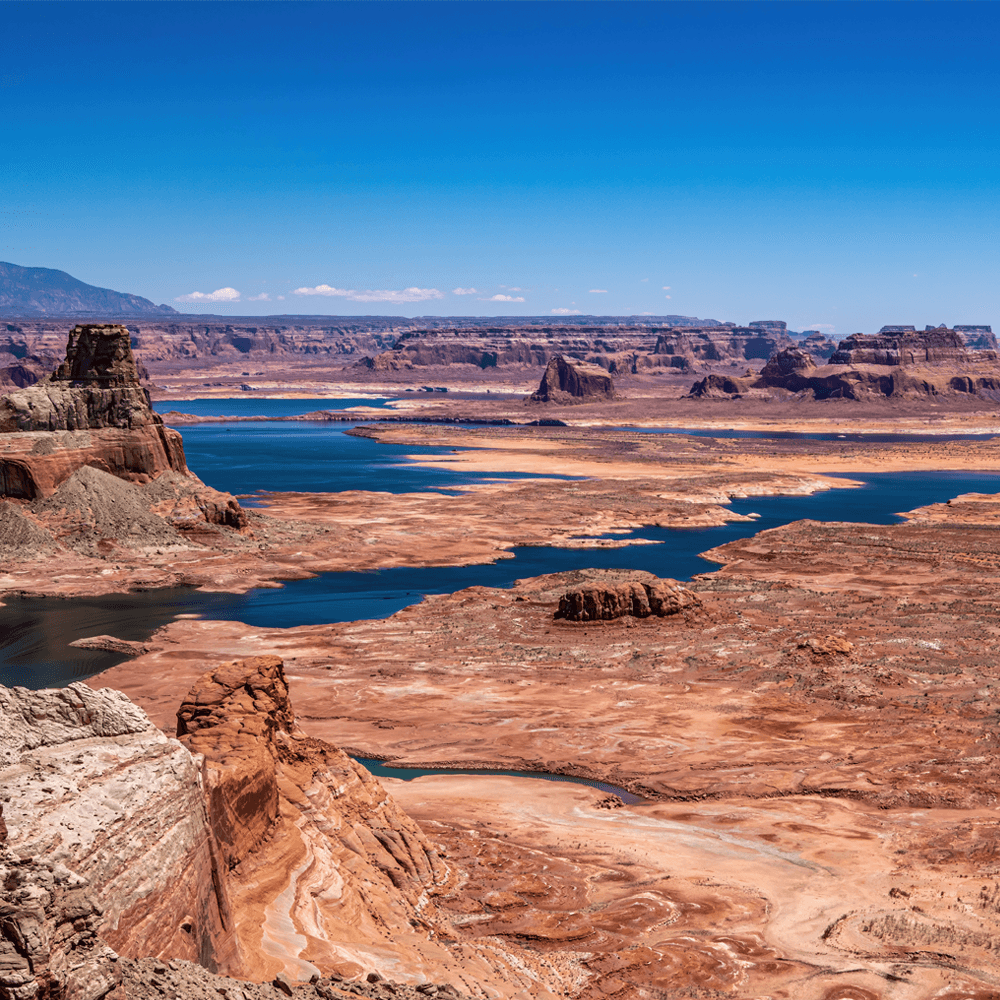AMWUA Blog
BY: AMWUA StaffWater agencies unite to reduce demands on the Colorado River

A historic drought, warmer climate, and overuse have all contributed to water levels in Lake Mead and Lake Powell rapidly declining to an unprecedented point. While drastic cuts and a long-term plan across the Basin States are needed to protect the Colorado River system, municipalities understand the severity of the Colorado River situation. Now is the time to pursue further conservation actions within their communities, knowing there will be less Colorado River water in the future.
Many municipal and public water providers in the Colorado River Basin affirmed their commitments to implement progressive water conservation programs, initiatives, policies, and actions within their respective communities by signing a Memorandum of Understanding (MOU) delivered to the Bureau of Reclamation Commissioner Camille Touton.
Under the MOU, announced today , each participating water agency will implement conservation actions, programs, and policies that are most appropriate and attainable for their community and water efficiency goals. These water providers and agencies primarily represent urban water users, including many of the AMWUA cities, which only account for a small fraction of the Colorado River's total water consumption; however, each drop reduced through the conservation strategies outlined will help protect water levels in Lakes Mead and Powell and position communities to better manage having less Colorado River water.
The commitments specified in the MOU are as follows:
1. Continue and expand programs to increase indoor and outdoor water use efficiency.
2. Develop ways to reduce the quantity of non-functional turf grass by 30% by replacing it with drought-tolerant landscaping while maintaining vital urban landscapes and tree canopies that benefit communities, wildlife, and the environment.
3. Increase water reuse and recycling programs where feasible.
4. Water providers will pursue tactics that are best tailored to preserve thriving communities, environmental health, and strong economies, such as:
- Transforming outdoor landscapes and urban environments in a manner that improves climate resilience and promotes an ethic of wise water use through mandatory watering schedules and compliance enforcement, incentivized turf removal, and limitations on new turf;
- Increasing efficiency of indoor fixtures and appliances;
- Employing best practices for industrial processes and commercial operations, including minimization of evaporative cooling;
- Adopting conservation-oriented rate structures to incentivize efficiency;
- Accelerating efforts to minimize water loss ;
- Improving coordination between land use and water planning efforts through improved processes, best management practices, and additional regulations, where appropriate, and
- Employing other strategies tailored to the unique needs of each community.
5. Collaborate with other water users in the Colorado River basin to bring the supply and use of the river into balance. A robust agricultural economy, healthy watersheds, opportunities to recreate, and vibrant communities are all vital to our western way of life. No one sector or state can achieve sufficient use reductions independently. For the sake of current and future generations, we all must work together to balance supply and use and preserve a functioning and healthy river system.
This current coordinated effort, in addition to the individual actions taken by our ten cities, reinforces the strong commitment and continued pledge by municipalities to be part of the solution.
The circumstances facing everyone who uses Colorado River water, including here in Arizona, are serious. The ten AMWUA cities recognize that and continue to plan for the worst-case scenario and every scenario in between. In addition to actions like those announced today, the Valley cities remain committed to conservation, which is vital to maximizing the use of their water supplies, especially as they face a future with less Colorado River water.
This latest collaboration reaffirms that municipal Colorado River users are dedicated to finding innovative and attainable solutions, yet, as mentioned, they cannot do it alone. While these listed municipal conservation actions are vital, they will not solve or correct the dire Colorado River situation. It will take more than voluntary actions to ensure durable reductions are achieved by all users in every Basin state and sector if we are going to be able to stabilize the Colorado River, so it remains a resource in our future. There is plenty of work to do, but coordinated efforts like those listed in today's MOU are critical and deserve to be recognized.
Today's announcement builds upon an initial MOU executed in August 2022 between Aurora Water, Denver Water, The Metropolitan Water District of Southern California, Pueblo Water, and Southern Nevada Water Authority and significantly expands participation commitments from water providers in all seven Basin States to water efficiency and implement best-practice to conserve water. In support of this collective effort, over 30 non-governmental organizations and environmental groups submitted letters of support for the MOU to Reclamation in solidarity with this collective water conservation commitment.
The full Memorandum of Understanding can be found HERE
For 50 years, Arizona Municipal Water Users Association has worked to protect our member cities' ability to provide assured, safe, and sustainable water supplies to their communities. For more water information, visit www.amwua.org .
